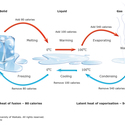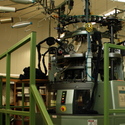The late 19th and early 20th centuries shared some of the same environmental issues that also concern us today: air and water pollution, power generation from coal and species1 extinction2. One difference between then and now is the shift in why some of our world’s species are endangered3. Previously, elephant tusks, tortoise shells and animal horns were in huge demand for items like piano keys, trinket boxes, hair accessories, buttons, cutlery handles and jewellery.
The world experienced a game-changer in 1909 when Bakelite – the first truly synthetic4 plastic5 – was patented. Plastic technology continued to evolve, and by the 1950s, plastic items were well and truly part of everyday life in many parts of the world. The new technologies not only replaced products made from animals but also from wood, glass, metal6 and natural textiles. Lightweight robust materials reduced breakage and transport costs and revolutionised travel, healthcare and many other aspects of human life.
Too much of a good thing
The same properties that make plastic so useful are the cause of many of the environmental problems we face today. Plastic items are inexpensive to produce so we’ve created a single-use disposable mindset. In 2015, the world produced 407 million tonnes of plastic, and nearly 75% of it was discarded as waste. This strong robust ‘miracle’ material takes a very long time to break down, and as it does, it creates microplastics.
We are aware that our planet – and especially our oceans – are burdened by plastic waste. It sits alongside climate change7 as one of the greatest threats to our ecosystems8. Governments, industries and individuals are uniting to try and tackle this global issue.
Rethinking plastics in Aotearoa New Zealand
Royal Society Te Apārangi and the Office of the Prime Minister’s Chief Science Advisor (OPMCSA) are taking key roles in addressing New Zealand’s response to plastic pollution.
Royal Society Te Apārangi released a report in July 2019 outlining the manufacture, use and disposal of plastics and how they enter and accumulate in the environment.
We are publishing this report to raise awareness of the extent of the issue of waste plastics and to provide information to help us collectively figure out how we can turn the issue of plastic pollution around in Aotearoa9. It complements a report on policy options and potential actions from Professor Juliet Gerrard’s Office of the Prime Minister’s Chief Science Advisor.
Royal Society Te Apārangi President Professor Wendy Larner
The Office of the Prime Minister’s Chief Science Advisor brought together a panel of experts and assessed assessed evidence10 assessing evidence of plastic use in Aotearoa New Zealand and “the range of social and technological solutions to issues in the plastic life cycle – from production through to consumer11 behaviour and disposal”. In December 2019, the findings were released in a report titled Rethinking Plastics in Aotearoa New Zealand.
The Rethinking Plastics project is … analysing and collating the evidence-base to guide a series of recommendations for Aotearoa New Zealand to mitigate12 the negative impacts of plastic while retaining its many benefits.
Office of the Prime Minister’s Chief Science Advisor
Then and now
More than a century after Bakelite’s introduction, Earth and its occupants still struggle with air and water pollution, emissions from coal and fossil fuels13 and species extinction – some of this due to our use, and misuse, of plastic.
It’s not all negative though. The timeline below presents a brief history of plastic: technological advances, societal and environmental impacts and some of the initiatives helping us rethink how we use plastics.
Related content
Plastic is a wicked problem14. It’s incredibly useful, but it’s also a huge environmental issue. A helpful resource is Thinking about plastic – planning pathways, which includes our interactive planning pathway – use this to begin a cross-curricular look at plastics.
Use these tools to tackle wicked problems15 like plastic in the classroom: Futures thinking toolkit, Ethics thinking toolkit and pedagogical support for tackling big global issues.
Citizen science in the classroom
Discover how teacher Dianne Christenson used the online citizen science16 project The Plastic Tide to help develop students’ science capabilities in a unit on sustainability in this case study and unit plan.
Bring some citizen science into the classroom with the local Litter Intelligence or the international projects: Litterati or Global Earth Challenge.
Useful links
Visit the Royal Society Te Apārangi website for the report Plastics in the Environment and other resources, such as their plastic factsheets – learn about plastic use, pollution and how to take action.
Visit the Office of the Prime Minister’s Chief Science Advisor website for project details about Rethinking Plastics in Aotearoa New Zealand.
- species: (Abbreviation sp. or spp.) A division used in the Linnean system of classification or taxonomy. A group of living organisms that can interbreed to produce viable offspring.
- extinction: In biology, the death of the last remaining individual of a species.
- endangered: A species that is possibly going to become extinct soon due to limited numbers of individuals alive or not enough habitat to live in.
- synthetic: Made in a laboratory or factory by a chemical process, usually to imitate a natural process.
- plastic: A synthetic material made from a wide range of organic polymers (such as polyethylene, PVC and nylon) that can be moulded into shape while soft and then set into a rigid or slightly elastic form.
- metal: Any of a category of elements that usually have a shiny surface, are generally good conductors of heat and electricity and can be melted or fused, hammered into thin sheets or drawn into wires (for example, copper).
- climate change: The large-scale, long-term increase in the Earth’s average temperatures, with associated changes in weather patterns. There is significant scientific evidence that warming is due to increased quantities of greenhouse gases in the atmosphere, with most of the rise due to human activity.
- ecosystem: An interacting system including the biological, physical, and chemical relationships between a community of organisms and the environment they live in.
- Aotearoa: The Māori name for New Zealand, meaning Land of the Long White Cloud.
- evidence: Data, or information, used to prove or disprove something.
- consumer: 1. An organism that feeds on other organisms to obtain energy for life processes. These organisms are also called heterotrophs. 2. A person who purchases goods and services for personal use.
- mitigate: To make less severe or to lessen the intensity. For example, mitigating climate change involves reducing greenhouse gas emissions and enhancing ‘sinks’ (such as forests, oceans and soils) that store the gases.
- fossil fuel: Materials such as coal, oil and natural gas formed from the fossilised remains of plants that lived many millions of years ago. Often burned as fuel – although this releases large amounts of CO2, which contributes to global warming. Fossil fuels are also not renewable – there is a limited amount.
- wicked problem: Complex problems that are extremely difficult to solve because of the many different aspects that interact. They often involve environmental, economic or political issues or a combination.
- wicked problem: Complex problems that are extremely difficult to solve because of the many different aspects that interact. They often involve environmental, economic or political issues or a combination.
- citizen science: Citizen volunteers participate in scientific projects and work in partnership with scientists to answer scientific questions.





















































